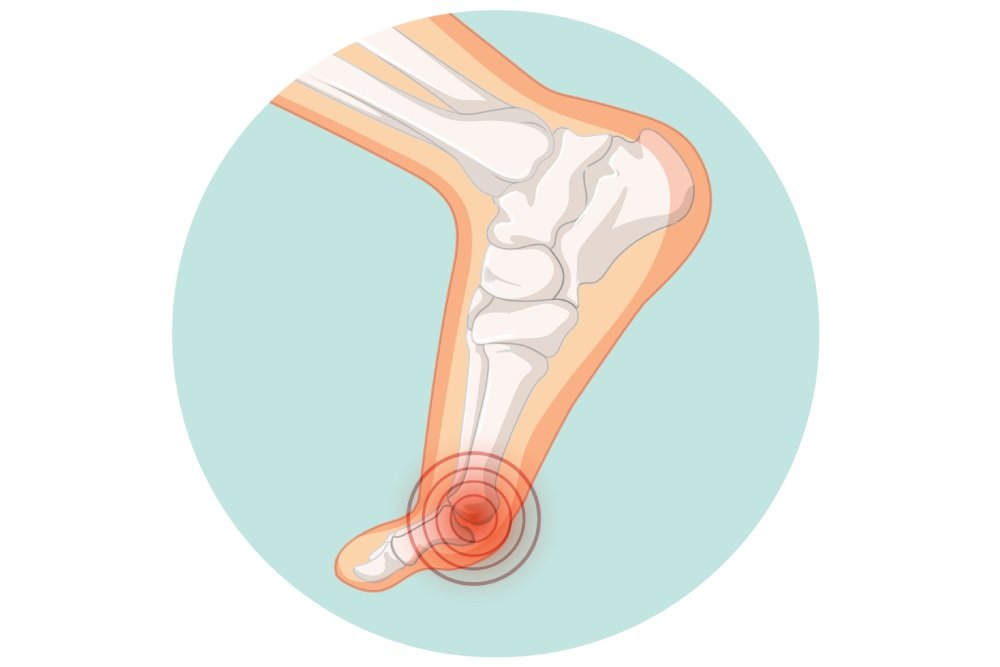
Neuromas Treatment
A neuroma, specifically a Morton’s neuroma, is a painful condition that affects the ball of the foot, most commonly between the third and fourth toes. It involves a thickening of the tissue around a nerve leading to the toes, causing sharp, burning pain, tingling, or numbness. At Axis Foot & Ankle, your trusted podiatrist in New Jersey, we offer a comprehensive approach to treating neuromas to alleviate symptoms, improve foot function, and prevent recurrence.
Here’s a detailed guide to the treatments we provide:
1. Diagnosis and Evaluation:
- Purpose: Confirm the presence of a neuroma and assess its severity.
- Description: Your podiatrist will conduct a physical examination of your foot, review your medical history, and discuss your symptoms. Diagnostic tests such as ultrasound or MRI may be ordered to visualize the neuroma and rule out other foot conditions.
2. Conservative Treatments:
a. Footwear Modification:
- Purpose: Reduce pressure on the neuroma and improve foot mechanics.
- Description: Wear shoes with a wide toe box and low heels to reduce compression on the forefoot. Avoid narrow, tight-fitting shoes or high heels that can exacerbate symptoms. Your podiatrist may recommend orthotic inserts or pads to provide cushioning and support.
b. Orthotic Devices:
- Purpose: Provide support and relieve pressure.
- Description: Custom orthotic inserts or arch supports may be prescribed to redistribute pressure on the foot and correct biomechanical imbalances that contribute to neuroma pain. Off-the-shelf inserts may also be effective in providing additional support and comfort.
c. Padding and Taping:
- Purpose: Reduce irritation and alleviate symptoms.
- Description: Padding or taping the affected area can help cushion the neuroma and reduce friction against shoes. Your podiatrist can demonstrate proper taping techniques or provide gel pads to relieve pressure on the neuroma during walking or activities.
d. Medications:
- Purpose: Relieve pain and inflammation.
- Description: Nonsteroidal anti-inflammatory drugs (NSAIDs) such as ibuprofen or naproxen may be recommended to reduce pain and inflammation associated with neuromas. Topical medications containing capsaicin or lidocaine may also provide temporary relief of symptoms.
3. Injection Therapies:
a. Corticosteroid Injections:
- Purpose: Reduce inflammation and alleviate pain.
- Description: Injections of corticosteroids directly into the area around the neuroma can provide temporary relief of symptoms by reducing inflammation and swelling. Repeat injections may be necessary for persistent pain relief.
b. Alcohol Sclerosing Injections:
- Purpose: Decrease the size of the neuroma.
- Description: Alcohol sclerosing injections involve injecting a solution of alcohol and local anesthetic into the neuroma to shrink its size and decrease nerve irritation. This procedure may provide longer-lasting relief compared to corticosteroid injections.
4. Surgical Interventions:
- Purpose: Address severe or persistent neuroma pain.
- Description: If conservative treatments and injections fail to provide relief, surgical excision of the neuroma may be considered. During this procedure, your podiatrist will remove the affected nerve tissue to alleviate pain and restore foot function. Surgical options vary depending on the size and location of the neuroma.
5. Patient Education and Prevention:
- Purpose: Empower patients to manage neuromas and prevent recurrence.
- Description: Educate on proper footwear choices, including avoiding high heels and narrow shoes. Encourage maintaining a healthy weight, performing stretching exercises to improve foot flexibility, and practicing good foot hygiene. Promptly addressing foot pain or discomfort can prevent worsening of neuroma symptoms.
6. Follow-Up Care:
- Purpose: Monitor recovery and adjust treatment as needed.
- Description: Schedule follow-up visits as recommended by your podiatrist to evaluate the effectiveness of treatments, monitor healing progress after injections or surgery, and adjust orthotic devices or footwear recommendations. Regular monitoring helps prevent recurrence of neuroma symptoms and promotes long-term foot health.
Why Choose Axis Foot & Ankle?
- Expertise: Our podiatrists specialize in diagnosing and treating neuromas with advanced techniques and personalized care plans.
- Compassionate Care: We prioritize your comfort and well-being throughout your treatment journey.
- Comprehensive Approach: From conservative treatments to surgical options and preventive education, we offer comprehensive care to effectively manage neuromas and improve your foot health.
If you are experiencing pain or discomfort due to a neuroma in Monmouth County, contact Axis Foot & Ankle for expert evaluation and personalized treatment. Schedule an appointment today
